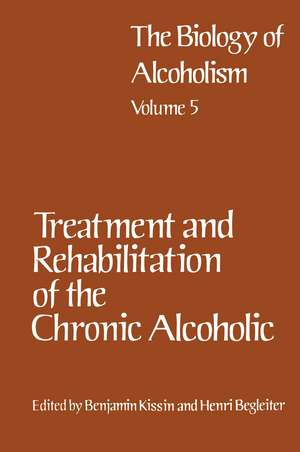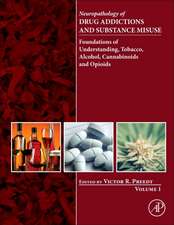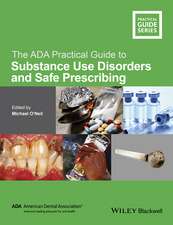Treatment and Rehabilitation of the Chronic Alcoholic
Editat de Benjamin Kissinen Limba Engleză Paperback – 29 iun 2013
Preț: 407.19 lei
Nou
Puncte Express: 611
Preț estimativ în valută:
77.92€ • 84.90$ • 65.66£
77.92€ • 84.90$ • 65.66£
Carte tipărită la comandă
Livrare economică 23 aprilie-07 mai
Preluare comenzi: 021 569.72.76
Specificații
ISBN-13: 9781461342014
ISBN-10: 1461342015
Pagini: 660
Ilustrații: XXV, 631 p. 4 illus.
Dimensiuni: 152 x 229 x 35 mm
Greutate: 0.87 kg
Ediția:Softcover reprint of the original 1st ed. 1977
Editura: Springer Us
Colecția Springer
Locul publicării:New York, NY, United States
ISBN-10: 1461342015
Pagini: 660
Ilustrații: XXV, 631 p. 4 illus.
Dimensiuni: 152 x 229 x 35 mm
Greutate: 0.87 kg
Ediția:Softcover reprint of the original 1st ed. 1977
Editura: Springer Us
Colecția Springer
Locul publicării:New York, NY, United States
Public țintă
ResearchCuprins
1 Theory and Practice in the Treatment of Alcoholism.- The Development of Alcoholism.- A Pathogenetic Classification of Alcoholics.- Implications for Therapy.- Treatment Models in Alcoholism.- The Multimodal, Multidisciplinary Approach to the Treatment of Alcoholism.- References.- 2 Medical Management of the Alcoholic Patient.- The Role of the Physician in the Treatment of Alcoholism.- Criteria for Diagnosis.- Criteria for Referral and/or Treatment.- Designing a Specific Treatment Plan.- References.- 3 Psychotherapeutic Approach.- General Considerations.- Initial Phase.- Middle Phase.- Late Phase and Termination.- Relationship Issues.- Individual Psychotherapy in Relation to Other Treatment Methods.- Summary.- References.- 4 Engaging the Alcoholic in Treatment and Keeping Him There.- Detection of the Alcoholic.- Engaging the Patient at the Referral Stage.- Keeping the Alcoholic in Treatment.- References.- 5 Toward a Social Model: An Assessment of Social Factors Which Influence Problem Drinking and Its Treatment.- Social Systems Theory and Its Role in the Social Model.- Social Etiological Factors in Drinking Behavior.- Treatment Approaches.- Conclusion.- References.- 6 Group Psychotherapy in Alcoholism.- Alcoholics Anonymous.- A Survey of Group Therapy with Alcoholics.- Conjoint and Family Groups.- Summary.- References.- 7 Family Therapy in Alcoholism.- Family Therapy as a Treatment Modality.- Family Therapy in Alcoholism.- Al-Anon Family Groups.- Discussion.- References.- 8 Behavioral Assessment and Treatment of Alcoholism.- Behavioral Theories of Alcoholism.- Behavioral Assessment Techniques.- Behavioral Treatment Approaches.- References.- 9 The Role of the Halfway House in the Rehabilitation of Alcoholics.- Halfway Houses.- Residents.- Rehabilitation.- A Theory of Rehabilitation.- Summary and Conclusions.- References.- 10 Evaluation of Treatment Methods in Chronic Alcoholism.- Treatment Goals and Outcome.- Treatment Length.- Spontaneous Improvement, or What Happens to the Untreated Alcoholic?.- Inpatient Treatment.- Outpatient Treatment.- Alcoholics Anonymous (A.A.).- Behavioristically Oriented Psychotherapy.- Drug Treatment.- Summary and Conclusions.- References.- 11 Factors in the Development of Alcoholics Anonymous (A.A.).- Introduction: Crisis for a Hungover Doctor.- The Growth and Size of A.A.- The Development of A.A. and Its Structure.- Evaluations of A.A. Effectiveness.- The Literature on A.A.- References.- 12 Role of the Recovered Alcoholic in the Treatment of Alcoholism.- Definitions.- Scope of Chapter.- Roles of the Recovered Alcoholic, Past and Present.- The Alcoholism Counselor as Member of a Treatment Team.- Thoughts on the Future of Recovered Alcoholics as Counselors.- References.- 13 Training for Professionals and Nonprofessionals in Alcoholism.- Significant Components of Training.- Examples of Programs.- Evaluation.- Guidelines for Designing a Training Program.- Conclusion.- References.- 14 Public Health Treatment Programs in Alcoholism.- Alcohol Problems in the United States.- The Rise of Organizational Interest in the Problem of Alcoholism.- Social Involvement with Problems of Alcoholism.- Changing Legal Patterns in the Public Approach to Alcoholism.- Involvement of the Federal Government in Alcoholism Problems.- Patterns of Alcohol Use and Abuse within Communities.- The Scope of Public Health Problems Involved in Alcoholism.- Community Alcoholism Treatment Services.- Using Available Agencies: The Experience of Industry.- A Model Alcoholism Treatment Program.- Prevention of Alcoholism.- Summary.- References.









